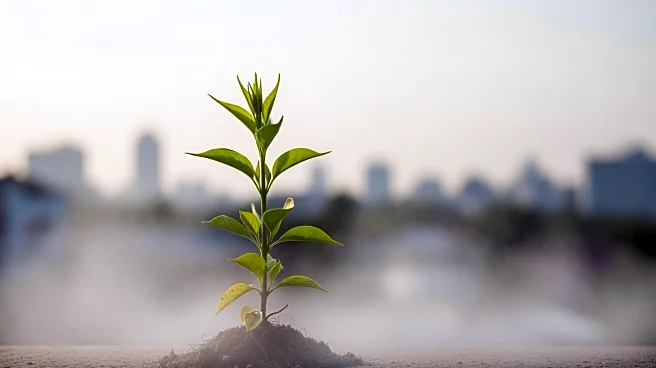What's Happening?
New Delhi, India's capital, is experiencing a severe air pollution crisis, with the air quality index reaching 344, a level deemed 'severe' by the World Health Organization. This has led to public protests,
with hundreds of residents, including parents and environmental activists, gathering at India Gate to demand government intervention. Protesters expressed frustration over the government's perceived inaction, carrying placards with messages like 'I miss breathing.' The protests were dispersed by police due to lack of permission. The city's air quality deteriorates each winter due to crop residue burning, vehicle emissions, and industrial pollution, exacerbated by dry and windless conditions.
Why It's Important?
The air pollution crisis in New Delhi highlights a significant public health emergency affecting millions of residents. The protests underscore the growing frustration among citizens who suffer from health issues like headaches and persistent coughs due to poor air quality. This situation demands urgent government action to implement long-term measures to reduce emissions. The crisis also reflects broader environmental challenges faced by India, which has several of the world's most polluted cities. Addressing this issue is crucial for improving public health, reducing healthcare costs, and enhancing the quality of life for residents.
What's Next?
The government may face increased pressure to implement effective policies to combat air pollution. Potential measures could include stricter regulations on industrial emissions, promoting cleaner energy sources, and enhancing public transportation to reduce vehicle emissions. Civil society groups and environmental activists are likely to continue advocating for sustainable solutions. The international community may also take interest, offering support or criticism based on India's handling of the crisis. Long-term strategies will be essential to prevent recurring pollution emergencies and improve air quality.
Beyond the Headlines
The air pollution crisis in New Delhi raises ethical questions about environmental justice and the responsibility of governments to protect public health. It also highlights the cultural dimension of environmental activism in India, where citizens are increasingly vocal about their rights to clean air. The situation could lead to shifts in public policy, prioritizing environmental sustainability and health over economic growth. Additionally, it may influence global discussions on climate change and pollution, as India plays a significant role in international environmental efforts.









